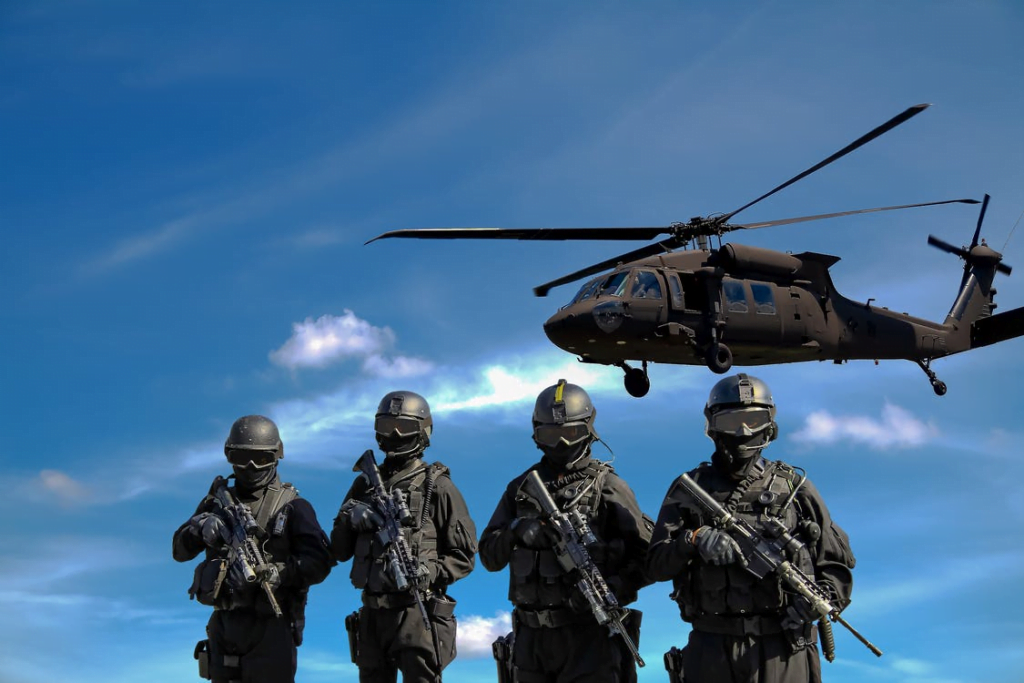The army is one of the most respected professions in America. This is a livelihood that not only provides true fulfillment, but also the opportunity to live your life according to your own values. We’ll be discussing the 11 best Army Officer Jobs in the US army.
The largest branch of the United States Armed Forces is the United States Army and statistics show that there was 481,254 active personnel as of 2020. But you need to know that there are many opportunities as an officer in the US army.
The army offers a chance for people who want to make a positive difference in the world. You can go into any army job and be successful if you work hard at your job, put in the hours and dedication, and put yourself out there.

An army officer’s job can vary wildly from country to country, but most officers are commissioned as infantry, artillerymen, engineers, or administrators. They ensure the military is on solid footing, whether it be defending their country from a hostile neighboring country or maintaining order if there was a natural disaster.
As an army officer, there are many opportunities in different job fields. Army officers work in just about every aspect of the armed forces. Army jobs range from counter-intelligence to logistics to psychological warfare or healthcare.
Before we go on to discuss the best army officer jobs in the U.S Army, let us talk about the requirements to join the military.
See also Best Navy Officer Jobs US army.
Requirements to join the military.
The Army, Navy, Air Force, Coast Guard, Marine Corps, and Space Force are the six branches of the U.S. armed forces. For each of the six, there are similar entry requirements. Age restrictions, test results, and fitness levels are where the main differences lie.
Women must adhere to different fitness standards than men. A branch may have additional requirements in addition to those that are mentioned here.
Age Limits for Enlisting
You must be at least 17 to enlist in any branch of the active military. The oldest you can be to enlist for active duty in each branch is:
- Coast Guard: 31
- Marines: 28
- Navy: 39
- Army: 35
- Air Force: 39
- Space Force: 39
Some branches have different age limits for their part-time Reserve and National Guard. Visit each service’s recruiting website for its part-time age limits.
Requirements for Enlisting If You Are Not a U.S. Citizen
You do not have to be a U.S. citizen to enlist in the military, but you may have fewer options. If you are not a U.S. citizen, you must:
- Have a permanent resident card, also known as a Green Card
- Currently live in the U.S.
- Speak, read, and write English fluently
Educational and Testing Requirements for Enlisting
You must take the Armed Services Vocational Aptitude Battery (ASVAB) test. The ASVAB has 10 subtests.
Your scores on four of those make up your Armed Forces Qualification Test (AFQT) score. This score determines which branch(es) you may join. Each branch has its own lowest score for joining.
Your scores on all 10 subtests determine which job specialties you qualify for.
You can prepare for the ASVAB by taking sample questions.
You must have a high school diploma or a GED to enlist. The services accept only a small number of people with GEDs each year. You can increase your chances of qualifying with a GED by:
Earning some college credits and
Scoring well on the Armed Forces Qualification Test (AFQT)
Health and Fitness Requirements for Enlisting
You must pass a military entrance medical exam. This includes a physical exam, hearing test, vision test, and height and weight measurements.
Each service has its own physical requirements and fitness standards. These depend on the demands of its mission. Even within the same branch, some jobs have tougher or extra requirements.
Best Army officer jobs US army
1. Military Police Officer
Military police officers are responsible for maintaining discipline, law, order, and security within military installations while enforcing military and criminal laws. They have an important role in preventing crime and enforcing the Uniform Code of Military Justice (UCMJ).
They also ensure the safety of military installations, personnel, families, and equipment. Basic duties include conducting security patrols and investigations, reporting violations of military rules, maintaining bases and equipment inventories, and providing reports on emergencies and accidents.
2. Military Intelligence (MI) Officer
The job of an MI officer is to collect and analyze military intelligence, including human intelligence, to prepare reports that help the commander understand the battlefield and predict enemy or strategic moves.
Their job is to protect the force by using their insights into tactical information. They are also responsible for protecting against acts of espionage and sabotage. MI officers often assist commanders in planning tactical missions and are involved in war strategies.
An intelligence officer supports the commander of combat units by collecting, processing, and analyzing all available intelligence information to produce capabilities to support future operations. The job requires extensive knowledge of military doctrine, organizational structure, and systems.
Intelligence officers are responsible for the planning and preparation of operational activities. They provide intelligence guidance to commanders to enhance their ability to plan and synchronize combat operations.
3. Cyber Operations Officer
Cyber Operations officers are responsible for protecting, destroying, and disrupting enemy networks and cyber systems. They will often work in teams to achieve this. Cyber officers are responsible for managing, directing, and carrying out missions to safeguard the Army’s IT systems by performing duties, resolving problems, and troubleshooting issues.
They also collect, track and analyze network information to better understand the enemy’s position. Cyber officers assist operations by providing real-time threat assessments on networks and assets in the field.
4. Army Pilot

Number 4 on our list of 11 Best Army Officer Jobs in the US army. These pilots operate rotary wing aircraft such as helicopters or other non-fixed wing aircraft, including unmanned aerial vehicles. They fly specified missions as directed by the command and must have a valid pilot’s license to qualify.
Some pilots are required to have a military pilot rating, authorizing them to act as flight leads. They fly in all weather conditions, day or night, and in all types of attack and transport missions.
5. Judge Advocate General (JAG) Officer
The job of a JAG officer is to prepare, develop, and conduct legal arguments for legal proceedings and other litigation related to military operations including courts-martial. They advise commanders on matters regarding the chain of command.
They are often assigned to the Judge Advocate General’s Corps and the Army Legal Services Agency. Other duties include conducting legal research for criminal, civil, and military law issues, writing legal documents such as contracts and pleadings and assisting in pre-trial investigations.
The JAG officer interprets and enforces the Military Rules of Evidence. They will adjudicate courts-martial, investigations, and pre-trial hearings. A JAG officer investigates, prosecutes, and defends crimes against military law in the legal system of the U.S. military.
A JAG officer serves as a legal advisor to all military operational areas. They interpret and enforce the rules of the UCMJ, develop legal concepts, and prepare cases for trial. A military justice system is created to ensure that every service member receives fair treatment in court or under administrative proceedings.

6. Health Services (Hospital) Corps Officer
A health services officer plans, implements, and monitors medical service directives. They administer medical facilities to help patients receive required health services. A health officer is responsible for the care of military personnel and their families.
They help implement policies for providing health care under the Uniformed Services Health Professions Act. This includes assessing issues relating to quality, access, utilization, and consequences. They also certify medical personnel and conduct physical examinations to determine fitness for duty.
7. Human Resources Officer
A human resources officer is the primary advisor to commanders on all issues pertaining to military personnel, including recruitment, promotion and reenlistment, career development, and job training. They also assist in the management of civilian personnel requirements. HR officers maintain and document policies, procedures, and programs.
They are responsible for assessing and providing leadership training to recruiters. HR officers conduct periodic interviews and investigations of applicants and members of the military. They may also be part of the Joint Duty Education Program.
8. Chaplain Corps Officer
A chaplain ministers to the religious, spiritual, and moral needs of the service members of the U.S. Army. They conduct worship services, provide religious counseling and perform rites and ceremonies. The U.S. Army Chaplain Corps is an evangelical Christian ministry that contains ordained, chaplain-appointed, commissioned, and enlisted personnel.
A chaplain reports to the commanding officer of their unit. They also consult with commanders on matters regarding religion in the military. They work with other branches of the military and government agencies to provide services and assistance to members of the military, families, and veterans.
9. Public Affairs Officer
The Army’s Public Affairs Corps provides information for current and future operations to the general public as well as to allied nations and international organizations. They plan, develop, deploy and support journalists who cover military operations and other newsworthy events.
They prepare news releases for the press as well as write news articles for use by reporters and also serve as spokespersons and provide information regarding current events. Public affairs officers are also responsible for providing information regarding safety and security to the public.
The Public Affairs Corps is responsible for providing the U.S. military with the resources they require to communicate its message. Public affairs officers manage and direct news operations, ensuring that the Army’s message of unity and professionalism is effectively conveyed to the media.
10. Special forces

The Army Special Forces is a combat unit that conducts unconventional warfare. They train soldiers to conduct special operations and advise combat commanders on unconventional warfare doctrine and techniques. They also conduct special reconnaissance missions, humanitarian interventions, and foreign internal defense operations.
Special forces provide training, guidance, and leadership to indigenous populations that may be hostile to the United States. They also seek out terrorist groups and help apprehend them.
11. Veterinary Clinical Medicine Officer
The U.S. Army Veterinary Corps provides veterinary care to the U.S. Army and its allied forces around the world. They provide direct medical support to combat units and manage veterinary services for the Army.
Veterinary clinical medicine officers manage health care for Army animals, including providing oversight and research on infectious disease control and prevention. They provide training in animal care and combat casualty care to service members and allied forces.
The Veterinary Corps Officer is specially trained to provide veterinary services, such as animal health examinations, disease diagnostics, and treatment of pets and other animals. The Veterinary Corps Officer is a member of the U.S. Army Veterinary Service and is considered a practitioner in animal clinical medicine.
Conclusion
The U.S. Army has proven to be a constant instrument of American military power. As one of the largest and most visible forces in the world, they have been integral in conflicts ranging from World War II to present-day operations in Iraq and Afghanistan.
The U.S. Army has not only successfully organized and trained personnel but also develops new technologies to further its operations. Throughout its history, the Army has provided a constant presence that has helped lead the nation in its quest for freedom and security.
Today, the Army is an important part of American defense. The Army, in addition to its combat operations, remains an important part of the United States forward strategy. The Army will continue to play a vital role in the defense of the United States and its allies.
What do you think about our list of Best Army Officer Jobs in the US army?









